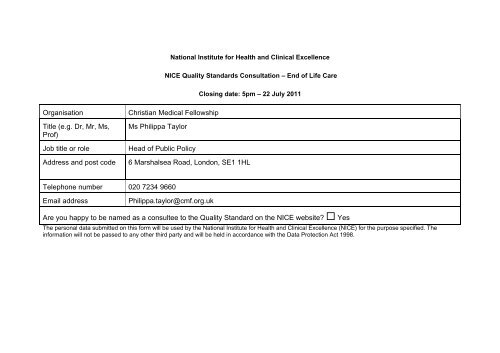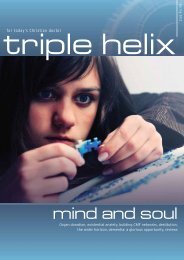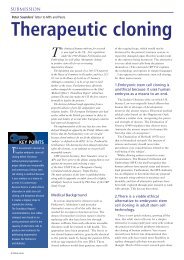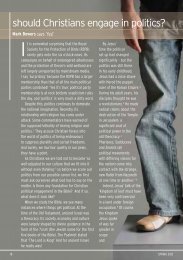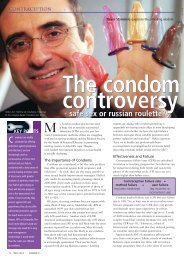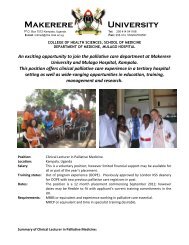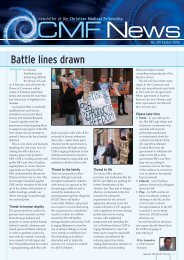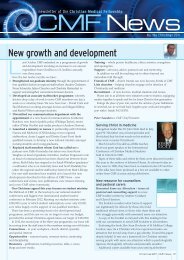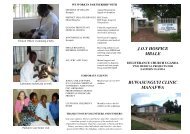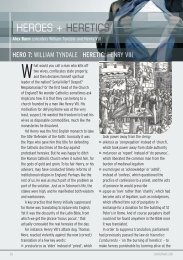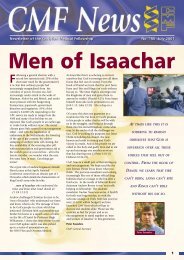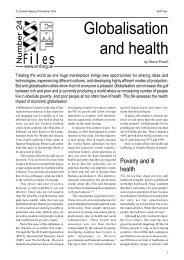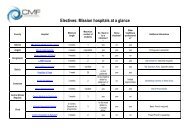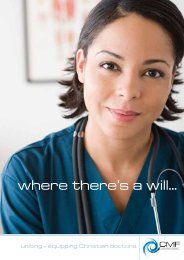Ms Philippa Taylor Job title or role Head of Public Poli - Christian ...
Ms Philippa Taylor Job title or role Head of Public Poli - Christian ...
Ms Philippa Taylor Job title or role Head of Public Poli - Christian ...
You also want an ePaper? Increase the reach of your titles
YUMPU automatically turns print PDFs into web optimized ePapers that Google loves.
National Institute f<strong>or</strong> Health and Clinical Excellence<br />
NICE Quality Standards Consultation – End <strong>of</strong> Life Care<br />
Closing date: 5pm – 22 July 2011<br />
Organisation<br />
Title (e.g. Dr, Mr, <strong>Ms</strong>,<br />
Pr<strong>of</strong>)<br />
<strong>Job</strong> <strong>title</strong> <strong>or</strong> <strong>role</strong><br />
Address and post code<br />
<strong>Christian</strong> Medical Fellowship<br />
<strong>Ms</strong> <strong>Philippa</strong> <strong>Tayl<strong>or</strong></strong><br />
<strong>Head</strong> <strong>of</strong> <strong>Public</strong> <strong>Poli</strong>cy<br />
6 Marshalsea Road, London, SE1 1HL<br />
Telephone number 020 7234 9660<br />
Email address<br />
<strong>Philippa</strong>.tayl<strong>or</strong>@cmf.<strong>or</strong>g.uk<br />
Are you happy to be named as a consultee to the Quality Standard on the NICE website Yes<br />
The personal data submitted on this f<strong>or</strong>m will be used by the National Institute f<strong>or</strong> Health and Clinical Excellence (NICE) f<strong>or</strong> the purpose specified. The<br />
inf<strong>or</strong>mation will not be passed to any other third party and will be held in acc<strong>or</strong>dance with the Data Protection Act 1998.
Please provide comments on the draft quality standard on the f<strong>or</strong>m below. When feeding back, please note the draft quality<br />
statement number and indicate whether you are referring to the statement, measure <strong>or</strong> audience descript<strong>or</strong>.<br />
In <strong>or</strong>der to guide your comments, please refer to the general points f<strong>or</strong> consideration on the NICE website as well as the specific<br />
questions detailed within the quality standard.<br />
Please add rows as necessary.<br />
Draft<br />
Quality<br />
Statement<br />
No.<br />
Question<br />
1+2<br />
General Questions:<br />
Comments about statements, measures and audiences.<br />
CMF welcomes this draft quality standard programme f<strong>or</strong> end <strong>of</strong> life care f<strong>or</strong> adults and the imp<strong>or</strong>tance that NICE attaches<br />
to the care <strong>of</strong> dying adults. If implemented as it stands, these standards will provide a comprehensive and welcome<br />
contribution to improving the care <strong>of</strong> adults, family and carers, and to meeting their holistic needs at the end <strong>of</strong> life.<br />
Caring f<strong>or</strong> patients at the end <strong>of</strong> life involves meeting people as individuals, and there is no ‘one size fits all’, which can be<br />
a limitation <strong>of</strong> a ‘tick box’ type approach. Each person’s journey towards the end <strong>of</strong> life is different, with some m<strong>or</strong>e<br />
concerned about relief from physical symptoms while f<strong>or</strong> others it is a m<strong>or</strong>e emotionally distressing. Each person is also<br />
on a spiritual journey through which they interpret the meaning <strong>of</strong> their lives. F<strong>or</strong> some this is religiously based while f<strong>or</strong><br />
others it is about personal w<strong>or</strong>th, questions <strong>of</strong> meaning and purpose, close relationships and contribution to ideals they<br />
hold dear.<br />
Unf<strong>or</strong>tunately, there is an over-representation <strong>of</strong> difficult and tragic deaths in the discussion around end <strong>of</strong> life, while<br />
witnesses <strong>of</strong> ‘good deaths’ do not feel such a need to enter into this type <strong>of</strong> c<strong>or</strong>respondence. This balance needs to be<br />
redressed so that people do not misunderstand and fear death, (and then, f<strong>or</strong> example, place an over reliance on the use<br />
<strong>of</strong> advance directives). We are particularly wary about the use <strong>of</strong> advance refusals and care plans that <strong>of</strong>fer premature<br />
withdrawal <strong>of</strong> nutrition, hydration, life-sustaining therapies and palliative treatments when as a society we now have
Draft<br />
Quality<br />
Statement<br />
No.<br />
Comments about statements, measures and audiences.<br />
developed a wealth <strong>of</strong> resources to assist people in difficulty.<br />
We have restricted our comments primarily to the spiritual needs <strong>of</strong> patients and to the personal care plans <strong>of</strong> patients. In<br />
our experience many patients approaching the very end <strong>of</strong> life (ie. last hours <strong>or</strong> days) are becoming drowsy and confused<br />
and are no longer able to discuss spiritual matters. Family members and carers <strong>of</strong>ten have need <strong>of</strong> spiritual supp<strong>or</strong>t. We<br />
theref<strong>or</strong>e suggest that it would also be beneficial to provide specific advice on how the spiritual needs <strong>of</strong> patients, families<br />
and carers might actually be met, and to ensure that it is then indeed met (and not f<strong>or</strong> this simply to become a tick box<br />
exercise).<br />
The standards do not address the broader question <strong>of</strong> whether nutrition and hydration are regarded as medical treatment<br />
<strong>or</strong> general care <strong>of</strong> patients in hospital - particularly the elderly, the disabled <strong>or</strong> confused patients. If it is medical treatment<br />
then the requirement is f<strong>or</strong> adequate and appropriate food and liquid administration to be <strong>or</strong>dered and supervised by a<br />
health care pr<strong>of</strong>essional, in a similar way to the administration <strong>of</strong> any drug regime. If it is general care there is a risk that it<br />
is regarded as the responsibility <strong>of</strong> the patient and their 'human rights' to take <strong>or</strong> refuse what is provided. This has lead to<br />
rep<strong>or</strong>ts on elderly patients losing weight in hospital when presented with food which they have difficulty in cutting up <strong>or</strong><br />
chewing, and drinks placed out <strong>of</strong> their reach - and at the end <strong>of</strong> the meal food and drink is removed without comment as<br />
it as regarded as the patient's choice not to eat <strong>or</strong> drink.<br />
QS3<br />
DESCRIPTOR: The assessment could include questions such as ' Would you like a visit from the chaplain/ vicar/<br />
priest/past<strong>or</strong>/ rabbi/iman etc' ‘Do you have a faith that helps you at times like this’, Where do you get spiritual and<br />
emotional supp<strong>or</strong>t’ Questions aimed at understanding a patient’s basic w<strong>or</strong>ld view (eg. atheist, theist, pantheist) will<br />
assist carers to provide appropriate supp<strong>or</strong>t. It should be recognised also that some healthcare pr<strong>of</strong>essionals, especially<br />
whose who have a personal faith, may well be competent to provide spiritual supp<strong>or</strong>t themselves. The GMC, RCGP and<br />
MDU have all recently affirmed the appropriateness <strong>of</strong> a ‘tactful’ <strong>of</strong>fer <strong>of</strong> prayer (see ‘GMC and MDU end<strong>or</strong>se 'tactful'
Draft<br />
Quality<br />
Statement<br />
No.<br />
Comments about statements, measures and audiences.<br />
<strong>of</strong>fers <strong>of</strong> prayer by GPs’ - http://t.co/OpTQl06) If so these services should be arranged.<br />
QS4<br />
Carers and family can be in need <strong>of</strong> as much, <strong>or</strong> even m<strong>or</strong>e, spiritual supp<strong>or</strong>t than the patient<br />
DESCRIPTOR: Carers and family could be asked if they would like a visit from the chaplain, vicar, rabbi <strong>or</strong> iman.<br />
Measures listed under QS3 above also appropriate.<br />
QS5<br />
QS6<br />
DEFINITIONS: include inf<strong>or</strong>mation/details about where and how to access spiritual supp<strong>or</strong>t<br />
MEASURE: We question what is meant by ‘local arrangements’ to help people develop personal care plans, and who<br />
might take this <strong>role</strong>.<br />
DEFINITIONS: There needs to be clarity on the differences between a care plan and advance directive/decision/refusal.<br />
We note that in Scotland under the Adults with Incapacity (Scotland) Act 2000 as well as Continuing Power <strong>of</strong> Att<strong>or</strong>ney f<strong>or</strong><br />
personal affairs, there is now the additional provision f<strong>or</strong> a Welfare Att<strong>or</strong>ney f<strong>or</strong> welfare affairs. The latter has the legal<br />
right to be involved in all discussions on healthcare, medical treatment etc. Mention should also be made <strong>of</strong> the provision<br />
<strong>of</strong> a health and welfare lasting power <strong>of</strong> att<strong>or</strong>ney under the Mental Capacity Act 2005.<br />
We recommend LPA over advance directives – better to trust a person with your best interests at heart than a piece <strong>of</strong><br />
paper which may be ambiguous <strong>or</strong> open to interpretation. In any event pressure should not be placed on patients to make<br />
f<strong>or</strong>mal advance directives <strong>or</strong> refusals and the anxieties underlying future undertreatment <strong>or</strong> overtreatment should be<br />
adequately addressed.<br />
QS 9<br />
Whilst f<strong>or</strong> some patients, their spiritual framew<strong>or</strong>k consoles them and contributes to their resilience, others may require
Draft<br />
Quality<br />
Statement<br />
No.<br />
additional supp<strong>or</strong>t from spiritual advis<strong>or</strong>s.<br />
Comments about statements, measures and audiences.<br />
However many patients approaching the end <strong>of</strong> life are becoming drowsy and confused and are no longer able to discuss<br />
spiritual matters. At the same time, family members and carers <strong>of</strong>ten have need <strong>of</strong> spiritual supp<strong>or</strong>t.<br />
DESCRIPTOR: We recommend that family members and carers be specifically <strong>of</strong>fered <strong>or</strong> invited to have access to that<br />
s<strong>or</strong>t <strong>of</strong> supp<strong>or</strong>t, and patient and family/carers should be <strong>of</strong>fered to invite a spiritual leader to visit.<br />
One imp<strong>or</strong>tant question not addressed in the standards is whether the health care pr<strong>of</strong>essionals caring f<strong>or</strong> the patient<br />
should be allowed to <strong>of</strong>fer spiritual supp<strong>or</strong>t/prayer f<strong>or</strong> the patient and family themselves, <strong>or</strong> whether they should only <strong>of</strong>fer<br />
to invite a suitable spiritual leader to provide that supp<strong>or</strong>t. The GMC and MDU have end<strong>or</strong>sed the tactful <strong>of</strong>fer <strong>of</strong> prayer by<br />
healthcare pr<strong>of</strong>essionals (see above) and the GMC Guidelines on Personal Beliefs and Medical Practice the GMC<br />
guidance states, that although faith discussions would not n<strong>or</strong>mally be part <strong>of</strong> the patient doct<strong>or</strong> consultation, there were<br />
occasions when they were appropriate. The W<strong>or</strong>ld Health Organisation’s definition <strong>of</strong> health includes physical, mental,<br />
social and spiritual dimensions and part <strong>of</strong> practising whole-person medicine means addressing all issues that have a<br />
bearing on a person’s health.<br />
The GMC guidance recognises that ‘all doct<strong>or</strong>s have personal beliefs which affect their day-to-day practice’ and that these<br />
principles apply to all doct<strong>or</strong>s whatever their political, religious <strong>or</strong> m<strong>or</strong>al beliefs. It emphasises that ‘personal beliefs and<br />
values, and cultural and religious practices are central to the lives <strong>of</strong> doct<strong>or</strong>s and patients’ (p4); that ‘patients’ personal<br />
beliefs may be fundamental to their sense <strong>of</strong> well-being and could help them to cope with pain <strong>or</strong> other negative aspects<br />
<strong>of</strong> illness <strong>or</strong> treatment.’ (p5) and that ‘discussing personal beliefs may, when approached sensitively, help you to w<strong>or</strong>k in<br />
partnership with patients to address their particular treatment needs.’ (p9)We would theref<strong>or</strong>e like to underline the<br />
appropriateness in some circumstances <strong>of</strong> healthcare pr<strong>of</strong>essionals providing spiritual care as part <strong>of</strong> whole person care.<br />
QS12<br />
DESCRIPTOR: to include the <strong>of</strong>fer to patient and family/carers to invite a spiritual leader to visit.
Draft<br />
Quality<br />
Statement<br />
No.<br />
Omissions<br />
Comments about statements, measures and audiences.<br />
One imp<strong>or</strong>tant omission we felt in the guidelines was a reference to the obligation to ensure that as part <strong>of</strong> end <strong>of</strong> life care<br />
patients are aware <strong>of</strong> and protected from exploitation and abuse.<br />
A recent rep<strong>or</strong>t by the Care and Social Services Inspect<strong>or</strong>ate f<strong>or</strong> Wales shows a 9% rise in the number <strong>of</strong> adult protection<br />
referrals in 2009-10. Around 5,000 cases <strong>of</strong> abuse are being investigated in Wales every year, the maj<strong>or</strong>ity <strong>of</strong> those cases<br />
involving older people.<br />
Elder abuse takes place in many different settings – f<strong>or</strong> example, the older person’s home, care homes, nursing homes<br />
and hospitals. It happens when an older person’s human rights and dignity are violated. It can come through financial<br />
scams, physical attacks, sexual abuse, psychological abuse <strong>or</strong> neglect. The perpetrat<strong>or</strong>s are <strong>of</strong>ten in a position <strong>of</strong> trust<br />
and have control <strong>of</strong> the life <strong>of</strong> the older person. Elder abuse can also include actions that many people might not consider.<br />
F<strong>or</strong> example, physical abuse can include inappropriate use <strong>of</strong> medication <strong>or</strong> f<strong>or</strong>ce feeding, emotional abuse can include<br />
treating an older adult like a baby <strong>or</strong> otherwise injuring his <strong>or</strong> her dignity, and sexual abuse includes any sexual contact<br />
with a person who is incapable <strong>of</strong> consenting.<br />
Furtherm<strong>or</strong>e, older adults are particularly vulnerable to less common f<strong>or</strong>ms <strong>of</strong> abuse, such as neglect and abandonment,<br />
violations <strong>of</strong> rights to privacy, community supp<strong>or</strong>t and inf<strong>or</strong>mation, and financial abuse, which is the most prevalent f<strong>or</strong>m <strong>of</strong><br />
abuse among older adults. Financial abuse is ‘the illegal <strong>or</strong> improper use <strong>of</strong> an incapacitated <strong>or</strong> vulnerable adult <strong>or</strong> his<br />
resources f<strong>or</strong> another’s pr<strong>of</strong>it <strong>or</strong> advantage.’ This type <strong>of</strong> exploitation can take many f<strong>or</strong>ms such as f<strong>or</strong>gery,<br />
misappropriation <strong>of</strong> cash <strong>or</strong> assets, abuse <strong>of</strong> joint accounts, <strong>or</strong> abuse <strong>of</strong> power <strong>of</strong> att<strong>or</strong>ney. Signs <strong>of</strong> financial exploitation<br />
may include disparity between income and assets, unexplained <strong>or</strong> sudden inability to pay bills, inaccurate <strong>or</strong> no<br />
knowledge <strong>of</strong> finances, fear <strong>or</strong> anxiety when discussing finances, <strong>or</strong> unprecedented transfer <strong>of</strong> assets to others.
Draft<br />
Quality<br />
Statement<br />
No.<br />
Comments about statements, measures and audiences.<br />
Closing date: 22 July 5pm<br />
PLEASE NOTE: The Institute reserves the right to summarise and edit comments received during consultations, <strong>or</strong> not to publish them at all, where in the<br />
reasonable opinion <strong>or</strong> the Institute, the comments are voluminous, publication would be unlawful <strong>or</strong> publication would be otherwise inappropriate.


